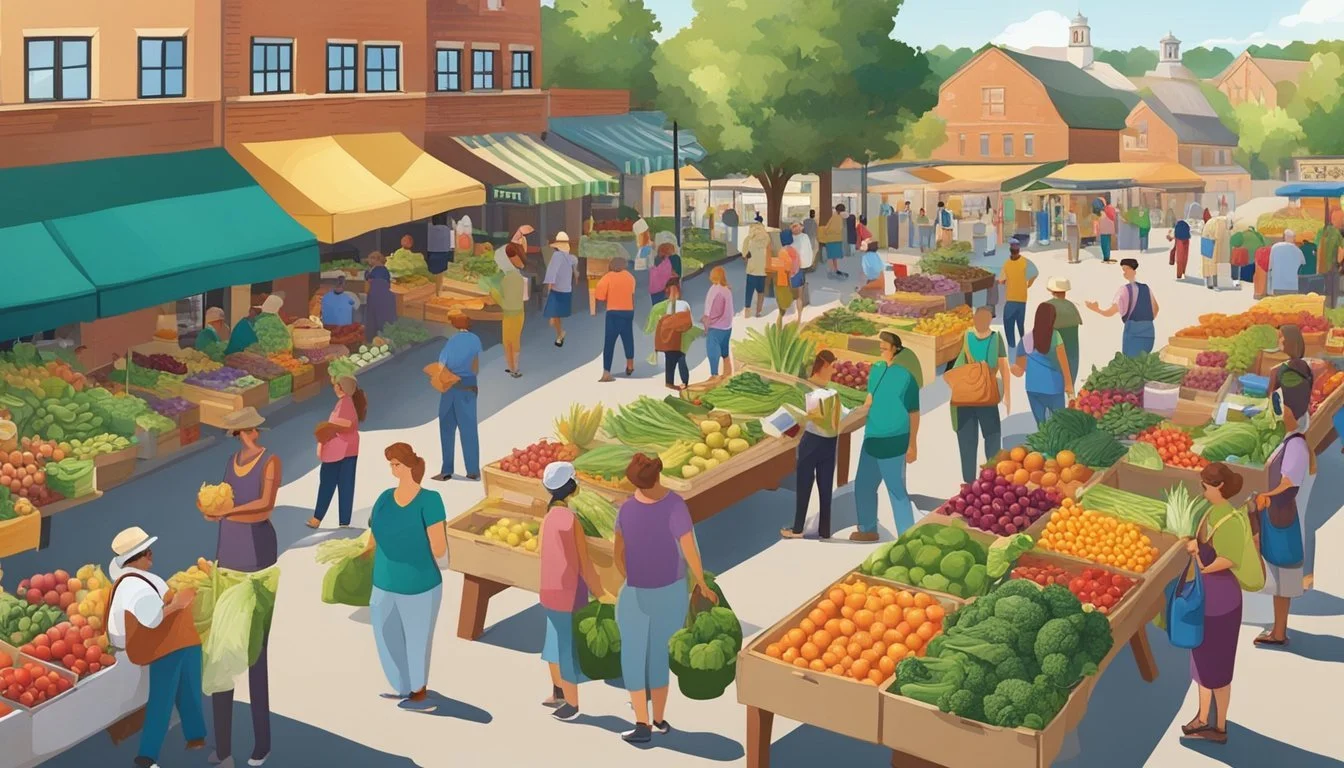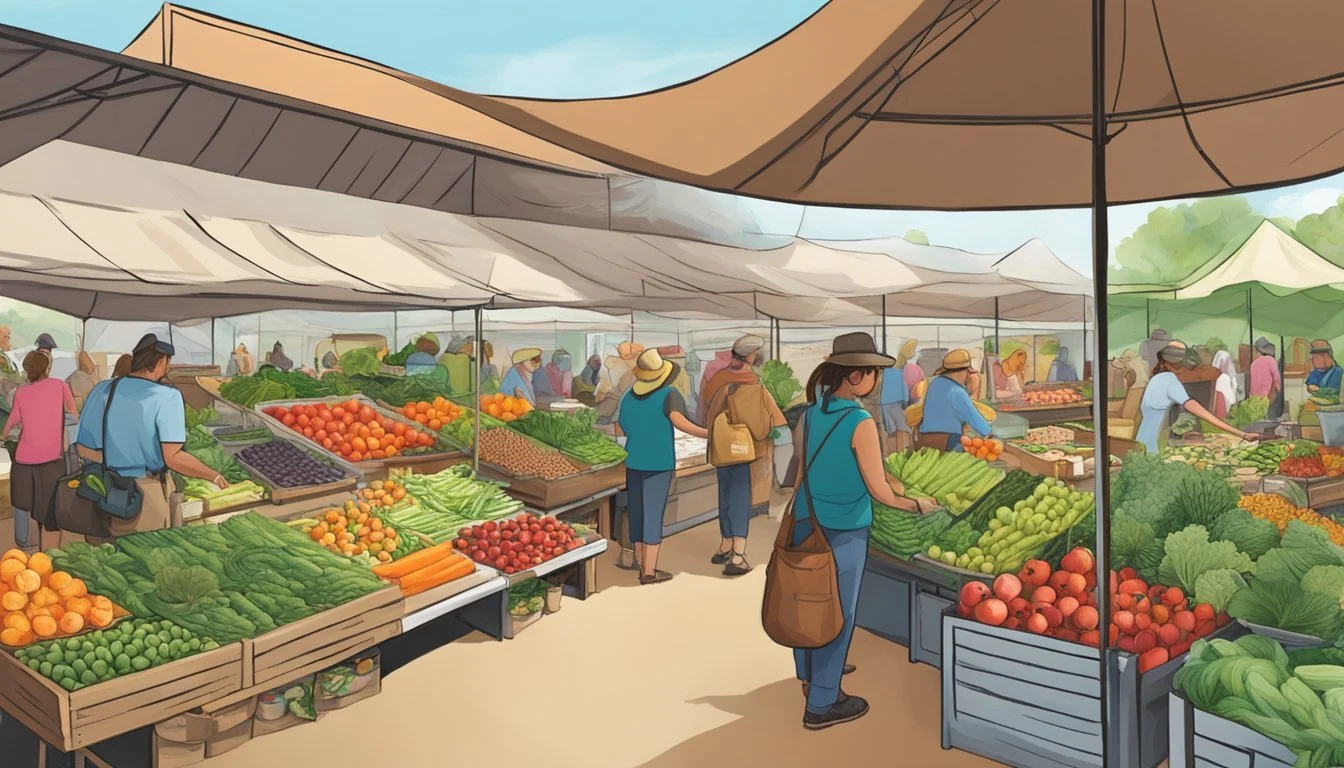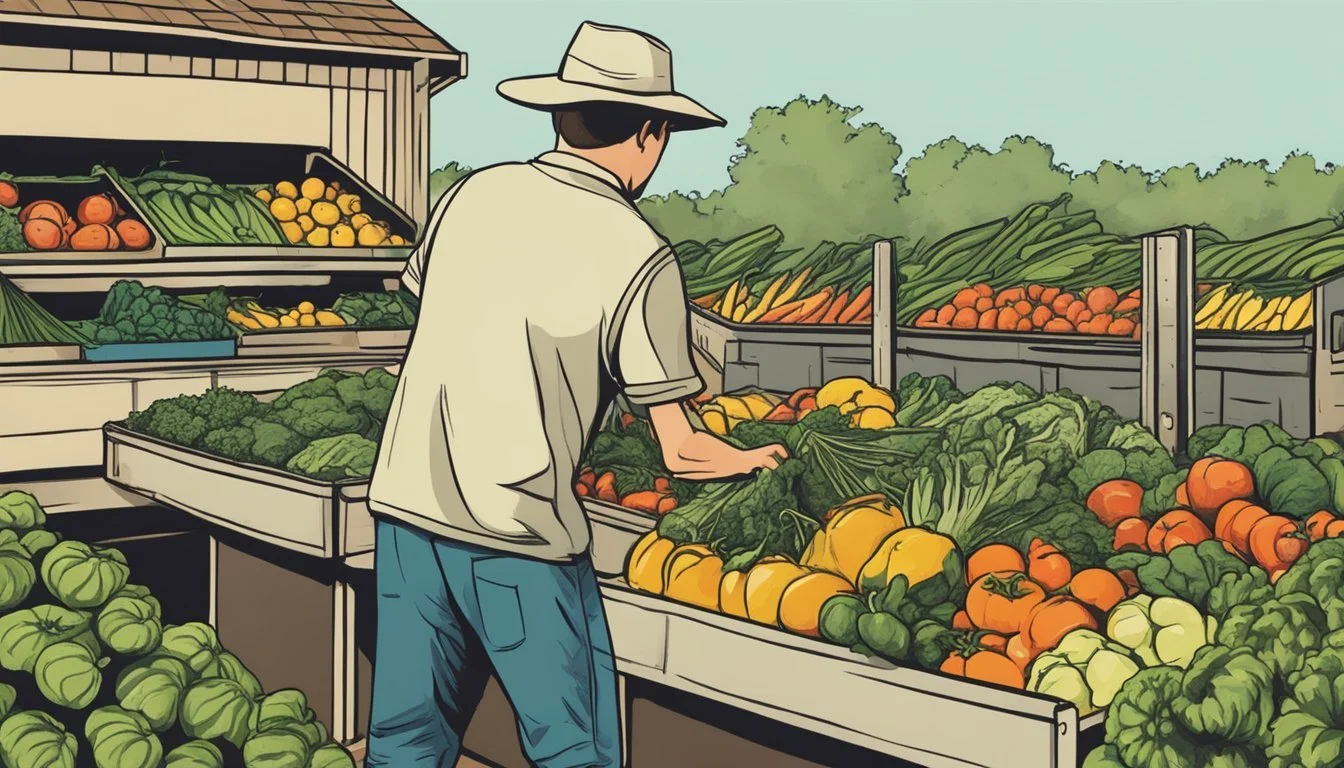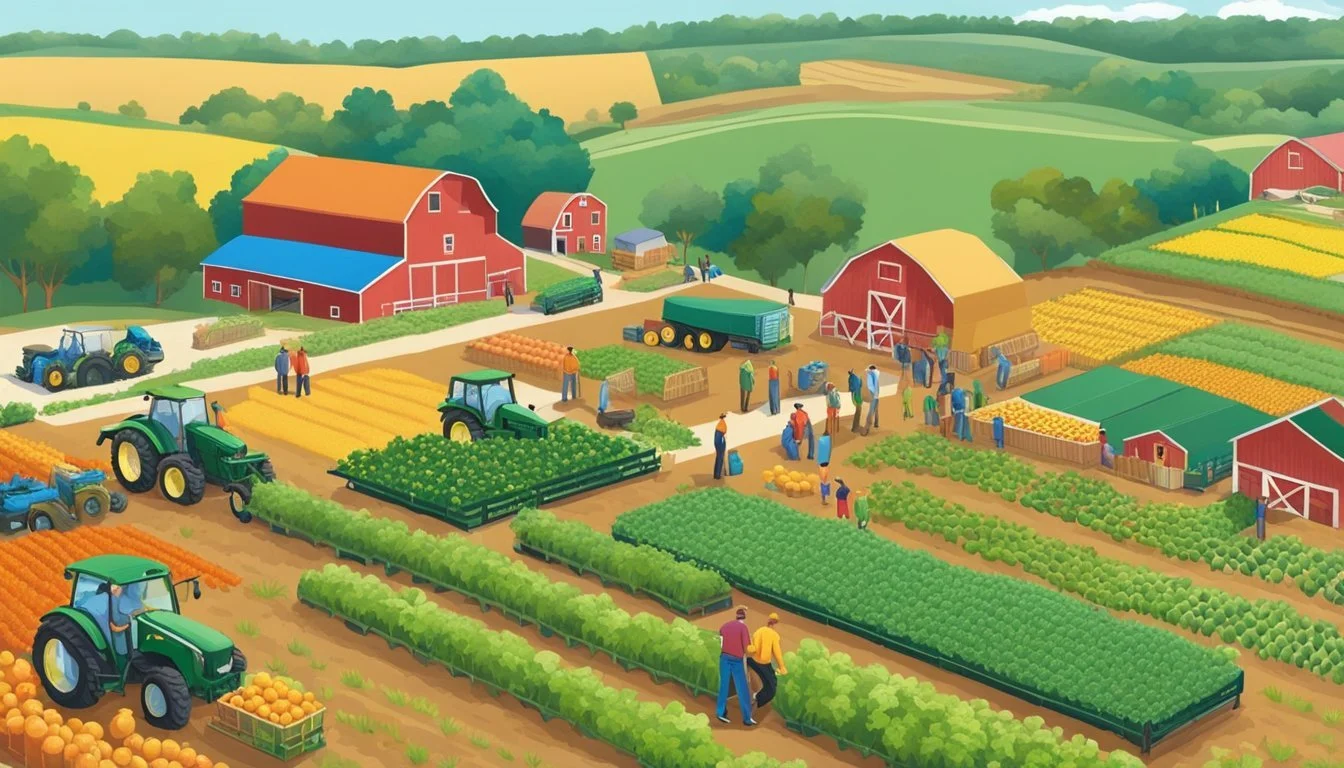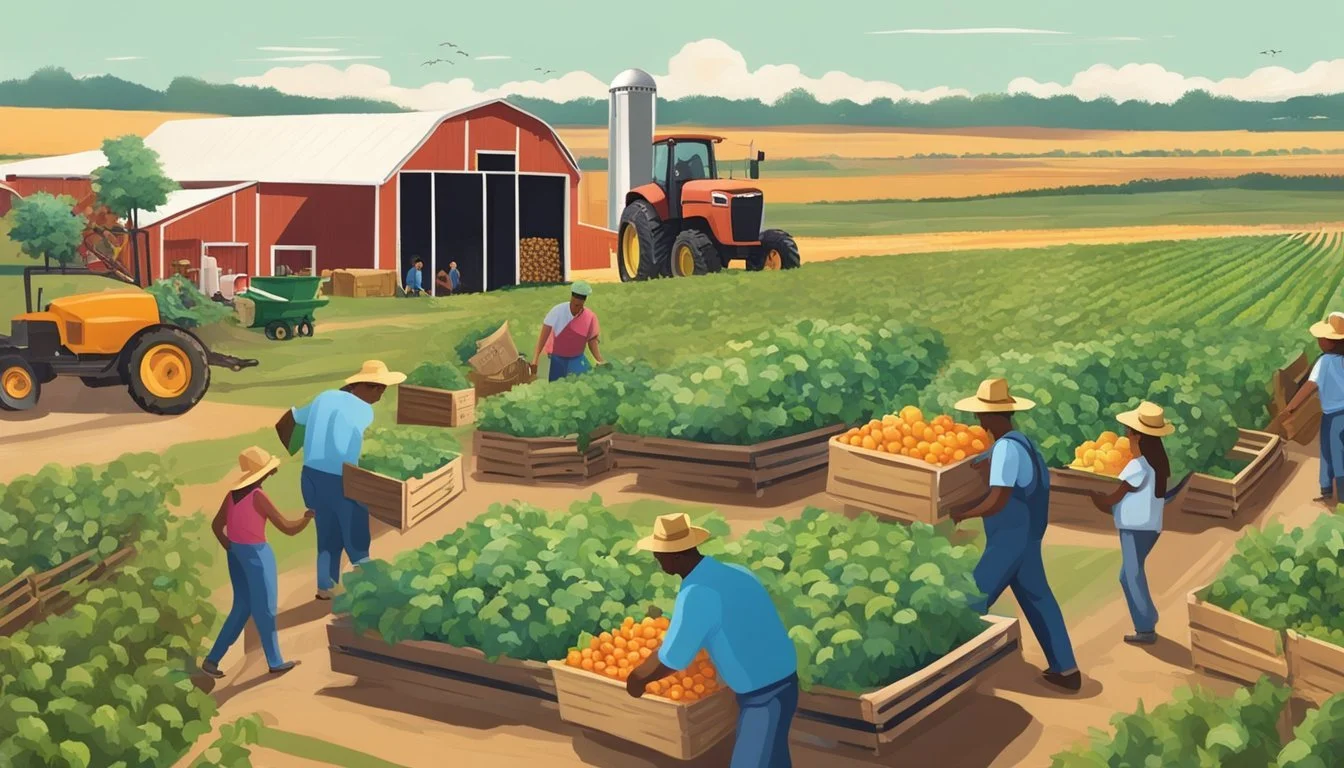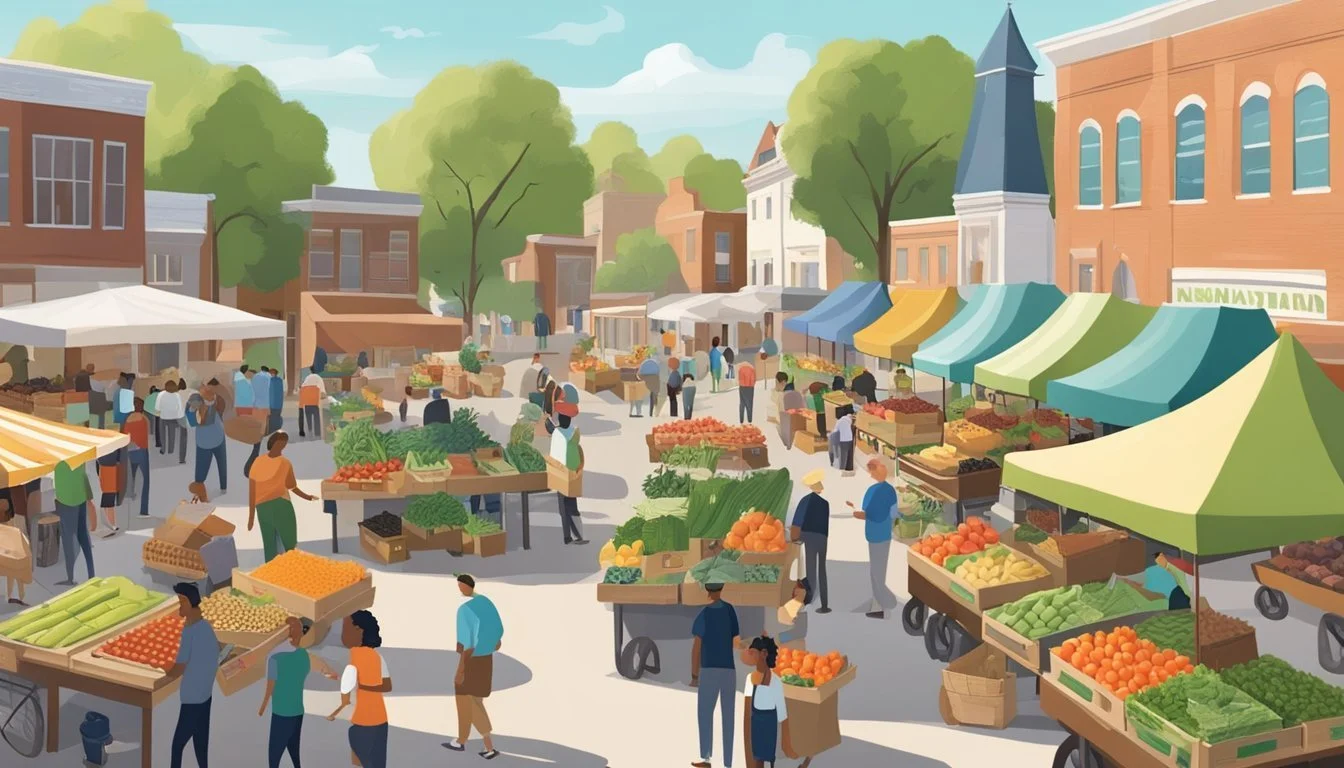Community Supported Agriculture (CSA) in Norman, OK
A Guide to Local Farm Partnerships
Community Supported Agriculture, commonly known as CSA, is a model of food production and distribution that connects local farmers directly with consumers. In Norman, Oklahoma, this system has taken root, offering residents the opportunity to buy seasonal food directly from local growers. CSAs in the area allow members to purchase shares of a farm's harvest in advance, providing them with a regular supply of fresh, locally-grown produce throughout the farming season.
The concept of CSA in Norman encourages a sense of connection between the community and the food they consume. By participating in a CSA program, members help to sustain local agriculture and contribute to the local economy. It also fosters a more intimate understanding of where and how their food is produced. This direct relationship between farmer and consumer helps to assure a market for the farmer's crops and gives consumers access to fresh food that is often organic or sustainably grown.
Furthermore, CSA members in Norman typically have the opportunity to visit their chosen farms, participate in farm events, and even get involved in the farming process through volunteer opportunities. This level of engagement not only strengthens community bonds but also promotes environmental education and awareness. The success of CSA in Norman reflects a growing trend towards sustainability and a collective effort to support a resilient local food system.
History and Concept of CSA
Community Supported Agriculture (CSA) originated in the early 1960s in Germany, Switzerland, and Japan, addressing the growing disconnect between consumers and the source of their food. The concept reached the United States in the mid-1980s when Indian Line CSA in South Egremont, Massachusetts, and Temple-Wilton Community Farm in Wilton, New Hampshire, were established.
CSA Model:
The CSA model is characterized by a partnership between local farmers and consumers. Consumers purchase "shares" of a farm's harvest in advance of the growing season. This economic relationship provides a stable operating budget for the farmer, and consumers receive fresh, seasonally appropriate produce throughout the farming season.
Local Food Systems:
Incorporating CSA into a community like Norman, OK, could strengthen local food systems by ensuring food dollars remain within the local economy. It also enhances the sense of community through regular interactions between consumers and the farms that feed them.
Community Relationship:
CSA encourages a strong consumer-farmer relationship, fostering transparency about food sources, methods used in cultivation, and mutual benefits. This relationship is not purely transactional but is built on mutual trust and a shared commitment to local agriculture.
Benefits of CSA:
Ensures the continuity of local agriculture
Provides consumers with a connection to seasonal and sustainable eating
Creates a community around local food
By participating in a CSA, members contribute directly to the health of their local food system and gain an understanding of their role within that system.
Benefits of Joining a CSA
Joining a Community Supported Agriculture (CSA) program in Norman, OK, provides individuals with multiple advantages.
Fresh and Nutritious Produce: Members receive an assortment of fresh, often certified organic, fruits and vegetables. This variety reflects the best of what the season offers, supporting optimal nutrition and taste.
Enhanced Relationships with Local Farmers: CSA fosters strong relationships between consumers and growers. Members develop a connection with the people who plant, tend, and harvest their food.
Support for Local Economy: Membership fees go directly to farmers, reinforcing the local economy and ensuring the viability of community agriculture.
Contribution to Environmental Sustainability: By purchasing farm products like vegetables, fruits, eggs, and more from a local source, members minimize their carbon footprint through reduced transport distances of produce.
Variety of Offerings: CSA members often have access to a diverse array of produce, which may also include other farm products depending on the specific CSA program.
Educational Opportunities: Members learn about seasonal produce and how it's grown, which can enhance their understanding of sustainable agriculture practices.
Health Benefit: Consuming fresh, seasonal, and certified organic produce contributes to better health, reducing the intake of harmful pesticides and chemicals.
In Norman, CSA membership is a commitment to oneself, the local economy, and the environment. It is a decision to become an integral part of the agricultural process, gaining a deeper appreciation for the effort that goes into growing nutritious and sustainable food.
CSA Structure and Share Options
Community Supported Agriculture in Norman offers various share options catering to consumer preferences and needs. These shares typically consist of a diverse range of farm produce, including fruits, vegetables, and often other products like meat, cheese, and flowers, depending on the specific CSA program.
Standard Shares
Standard shares represent the traditional CSA model, where members receive a pre-determined quantity of seasonal produce each week or bi-weekly. The content of these shares changes with the growing season and includes a wide assortment of freshly harvested vegetables and fruits. Some CSAs provide the additional option of including meat, cheese, or flowers.
Spring Season: Typically light on fruit, with an emphasis on leafy greens and root vegetables.
Inclusions: Vegetables (e.g., lettuce, carrots), possibly limited spring fruit offerings (e.g., strawberries)
Market-Style Shares
With market-style shares, members enjoy more flexibility. Instead of receiving a set box of items, they may have the choice to select from the available seasonal produce at a designated CSA market or pickup location. This share style simulates the experience of shopping at a farmers’ market.
Selection: Choose from a range of vegetables, fruits, meats, cheeses, and flowers.
Seasonal Availability: Dependent on what is currently in season; spring shares might include early produce like peas and radishes.
Subscription Services
CSA subscription services operate on a convenient, recurring delivery or pickup schedule. Members subscribe for a season, and in return, they get regular, fresh-from-the-farm foods delivered to their doorstep or to a local pickup spot.
Frequency: Weekly, bi-weekly, or monthly subscriptions.
Customization: Some CSAs offer options to customize boxes with preferred produce or add-on specialty items.
Selecting the Right CSA in Norman
When choosing a CSA in Norman, Oklahoma, prospective members should consider several critical aspects to ensure they select a program that aligns with their needs and values.
Understanding the CSA Model: Community Supported Agriculture is a model where consumers purchase shares of a farm's harvest in advance. This model supports local farmers, strengthens the community, and provides members with fresh, seasonal produce.
Local Options: Norman offers various CSA programs such as the Acadian Family Farm which has been growing vegetables for over 30 years and is Certified Organic. With options available, consumers are advised to research farms to find ones that best fit their lifestyle.
Questions to Ask: Before committing to a membership, individuals should:
Inquire about the length of the CSA season and the variety of produce offered.
Verify if the farm employs organic and sustainable farming practices.
Understand the pick-up locations and times for CSA shares.
Determine the level of commitment required, such as up-front fees and volunteering.
Key Consideration Action Step Season Length Check how long the CSA runs and what's offered each season. Farm Practices Ask about organic certification and farming methods. Pick-up Details Confirm location, times, and flexibility. Commitment Evaluate cost structure and required involvement.
By taking these steps, community members can confidently select a CSA that enriches their connection to local agriculture and provides them with a reliable source of fresh, quality produce.
Local CSA Farms in Norman, OK
Community Supported Agriculture (CSA) is a popular way for consumers to buy seasonal food directly from local farms. By subscribing to a CSA, members benefit from fresh produce while supporting their local farmers and sustainable agriculture practices.
Three Springs Farm
Location: Oaks, OK
Products: Certified organic vegetables and fruits
CSA Details: Members receive a variety of produce, emphasizing sustainable farming practices.
Bootstrap Farm
Location: Nearby Norman, OK
Products: Seasonal, locally-grown produce
CSA Details: Focuses on providing a weekly delivery of fresh vegetables and fruits to its subscribers throughout the growing season.
Oaks
Location: Oaks, OK
Specialty: Known for the production of organic and healthful produce.
Community Impact: Farms in Oaks, including Three Springs Farm, contribute significantly to the area's CSA options.
Bristow
Location: Bristow, OK
Farm Attributes: Offers farm-fresh, locally-sourced produce from family-owned farms.
Farmers Market Connection: Many CSA farms near Bristow often participate in local farmers markets, serving both CSA subscribers and market-goers.
Each farm brings its unique set of offerings to the CSA landscape in Norman, enhancing the community's access to fresh, sustainable, and local food.
What to Expect During the Farming Season
In Norman, OK, the farming season for Community Supported Agriculture (CSA) is a period marked by a flourishing assortment of produce and activities. Members should anticipate a rotation of crops that reflect the region's seasonal changes.
Early Season: Spring ushers in delicate greens, including lettuces and kale, as well as root vegetables such as radishes and carrots. The weather can still be quite variable, but resilient plants that can withstand cooler nights make their way into CSA boxes.
Mid Season: Summer brings an abundance of variety. Members can expect a vibrant selection of vegetables:
Corn: A staple in summer shares, sweet and ready for grilling.
Squash: Both summer varieties like zucchini and winter squashes that store well.
Peppers: Ranging from sweet bell peppers to zesty hot varieties.
During this time, local farmers markets often see an increase in attendance, and CSA members benefit from this peak of production.
Late Season: As autumn approaches, the array of produce shifts. Squashes and hardier vegetables dominate CSA offerings. This is also the season for ornamental and cut flowers, which add a splash of color to members' shares.
Throughout the farming season, CSA participants support local agriculture and contribute to a sustainable food system. The understanding that weather directly impacts the yield and variety of produce encourages a community built on flexibility and support. By becoming part of a CSA in Norman, members can look forward to fresh, seasonal produce while fostering a direct connection with their food and local farmers.
Preparing and Using CSA Produce
Community Supported Agriculture (CSA) provides members with a variety of seasonal produce, often including vegetables, fruit, meat, and eggs. CSA shares challenge consumers to explore new recipes and cooking methods based on the week's offerings. It encourages a diet that is both seasonal and varied.
When preparing CSA produce, one should wash all vegetables and fruit thoroughly, as these items are freshly harvested and may still have traces of soil. Leafy greens, in particular, may need to be rinsed several times.
Storage is crucial for freshness. Most root vegetables prefer a cool, dark environment, whereas leafy greens should be kept in moisture-controlled compartments in your refrigerator. Eggs and meat, meticulously sourced from local farms, should be refrigerated promptly.
To make the most of the produce, individuals can:
Cook Seasonal Recipes: Use seasonal vegetables and fruits as the centerpiece in meals.
Batch Cook: Prepare and cook large quantities of produce to create meals that can be enjoyed throughout the week.
Preserve the Bounty: Preserve vegetables and fruits through canning, freezing, or drying.
The following table provides tips on how to prepare and cook a few common CSA items:
Produce Preparation Tips Zucchini Slice for stir-fries, grate for zucchini bread. Beets Roast to enhance their natural sweetness. Spring Greens Use raw in salads or lightly sauté. Eggs Make omeletes with fresh vegetables, or boil for snacks. Chicken Roast with herbs and seasonal vegetables.
Embracing a CSA is not just about receiving food; it's about forming a partnership with local farmers and encouraging a connection with the source of one's meals. This closer relationship with food production allows for better appreciation of the effort that goes into growing and providing quality produce.
Community Engagement and Education
Community Supported Agriculture (CSA) programs in Norman, Oklahoma, foster a deep sense of community through active participation and education. Engagement with CSAs educates local residents on the importance of sustainable farming and strengthens the bond between consumers and the source of their food.
Local farms engage community members by offering:
Hands-on experiences: Participating in CSAs provides individuals with the opportunity to visit the farms, witness the growing process, and sometimes volunteer, giving them a concrete understanding of where their food originates.
Educational Workshops: farms may host workshops on topics such as organic farming practices, seasonal food preparation, and the benefits of local farm products.
Relationship-building events, such as farm-to-table dinners and seasonal celebrations, bring members together to enjoy the fruits of the harvest and to appreciate the labor that went into producing them. These events solidify the relationship between the farmers and the community.
CSA programs in Norman typically include:
Weekly shares of fresh produce during the harvest season.
Newsletters with farm updates, product information, and recipes.
The CSA model not only supports the local economy by ensuring farmers have a stable income but also educates its members on:
Nutritional value of fresh, locally-sourced farm products.
Environmental benefits of supporting local agriculture.
By directly linking the community to these educational elements and farm products, Norman's CSA programs work to cultivate an informed, engaged, and supportive local community.
Challenges and Considerations
When exploring Community Supported Agriculture (CSA) in Norman, Oklahoma, it's important to consider various challenges that stakeholders face. A crucial factor is weather variability, which significantly impacts crop yields. Unpredictable weather patterns, such as droughts or unforeseen frosts, can threaten the success of a CSA's growing season, affecting the quantity and quality of produce available for shareholders.
Shareholders must be prepared to share in the risks and rewards of agriculture. They often have questions regarding the sustainability and reliability of their shares. Transparency in how CSAs manage adverse weather conditions and crop failures is essential in maintaining trust.
CSAs operate on a model where customers pay upfront for a season's worth of produce. This requires consumers to consider the following:
Economic investment: Money is paid at the start, but the quantity of produce cannot be guaranteed.
Dietary variety: Shareholders should be open to receiving a diverse array of produce, which depends on seasonal availability.
Operational challenges for CSA providers in Norman include:
Logistics: Distribution of shares must be efficient to ensure freshness and convenience.
Communication: Regular updates about crop status and availability help manage shareholder expectations and satisfaction.
In conclusion, CSAs in Norman, OK must balance the uncertainties of farming with effective stakeholder communication and robust planning to overcome the inherent challenges of agriculture.
CSA Impact on Local Economy and Environment
Community Supported Agriculture (CSA) has become a pivotal part of Norman, Oklahoma's local economy. By subscribing to CSA programs, residents invest directly in local farmers, providing economic stability for small producers. This model diverges from industrial agriculture by focusing on community interaction and sustainable farming practices, strengthening the local food system.
Economically, CSAs contribute to the viability of local farms by allowing farmers to receive upfront payments, which can be used for planting and harvesting crops. This payment model reduces financial risks for farmers and keeps money circulating within the local community. Moreover, CSAs create jobs and can encourage local entrepreneurship within the agricultural sector.
From an environmental perspective, CSAs in Norman reduce the carbon footprint associated with food transport. Since the food is grown and distributed locally, less energy is consumed compared to the long-haul distribution of industrial agriculture. USDA reports indicate that shorter supply chains contribute to lower greenhouse gas emissions.
Environmental benefits of CSAs include:
Enhanced soil health through sustainable farming practices.
Biodiversity conservation due to varied crop production.
Reduced use of synthetic fertilizers and pesticides, minimizing runoff and groundwater pollution.
By supporting CSAs, the Norman community embraces a model prioritizing ecological health alongside economic benefits. These local systems are designed to be more resilient and less reliant on the resource-intensive methods of conventional agriculture, offering a more sustainable option for consumers concerned with the environmental repercussions of their food choices.
Frequently Asked Questions
What is Community Supported Agriculture (CSA)?
CSA is a model where consumers purchase shares of a farm's harvest in advance. Members pay for a season's worth of produce, providing the farmer with needed capital up front.
How does CSA membership work?
Individuals buy a share or membership, often through installment payments or a single lump sum. In return, they receive a box of seasonal produce, typically distributed weekly.
What might a share include?
Shares usually consist of a variety of seasonal produce, depending on what the farm harvests at that time. The content varies as the season progresses.
Where can members pick up their produce?
Produce pick-up is usually at designated locations including farmers markets or directly at the farm. Some CSAs also deliver directly to the member's home.
Are there CSAs in Norman, OK?
Yes, there are several CSAs operating near Norman, OK, offering fresh, local produce to community members.
What are the benefits of joining a CSA?
Members enjoy fresh produce, support local farmers, and contribute to sustainable farming practices. They often have access to unique or heirloom varieties not found in grocery stores.
What is the typical duration of a CSA season?
A CSA season can range from late spring through early fall, aligning with the farm's growing season, typically lasting about 20–25 weeks.
Can I visit the farm as a member?
Many farms encourage visits and provide volunteer opportunities, allowing members to connect with the land and see where their food is grown.
Term Definition CSA A system that connects farmers with consumers pre-season. Share/Membership A portion of the farm's harvest available for purchase. Seasonal Produce Crops that are grown and harvested in their respective season.
For other inquiries, it's recommended to contact the specific CSA directly for the most accurate information.

